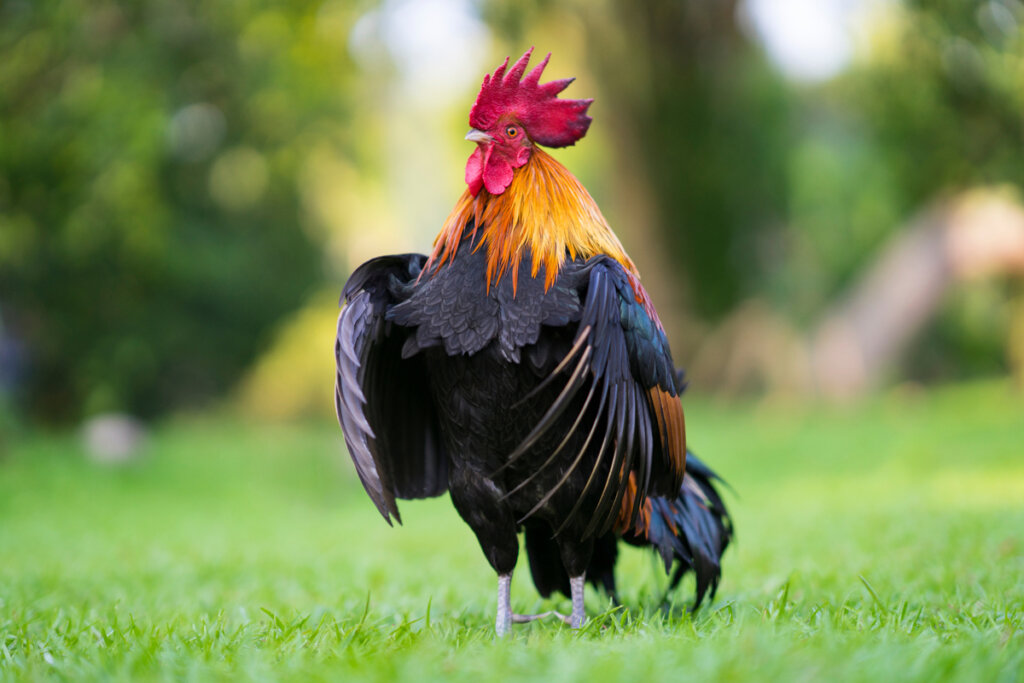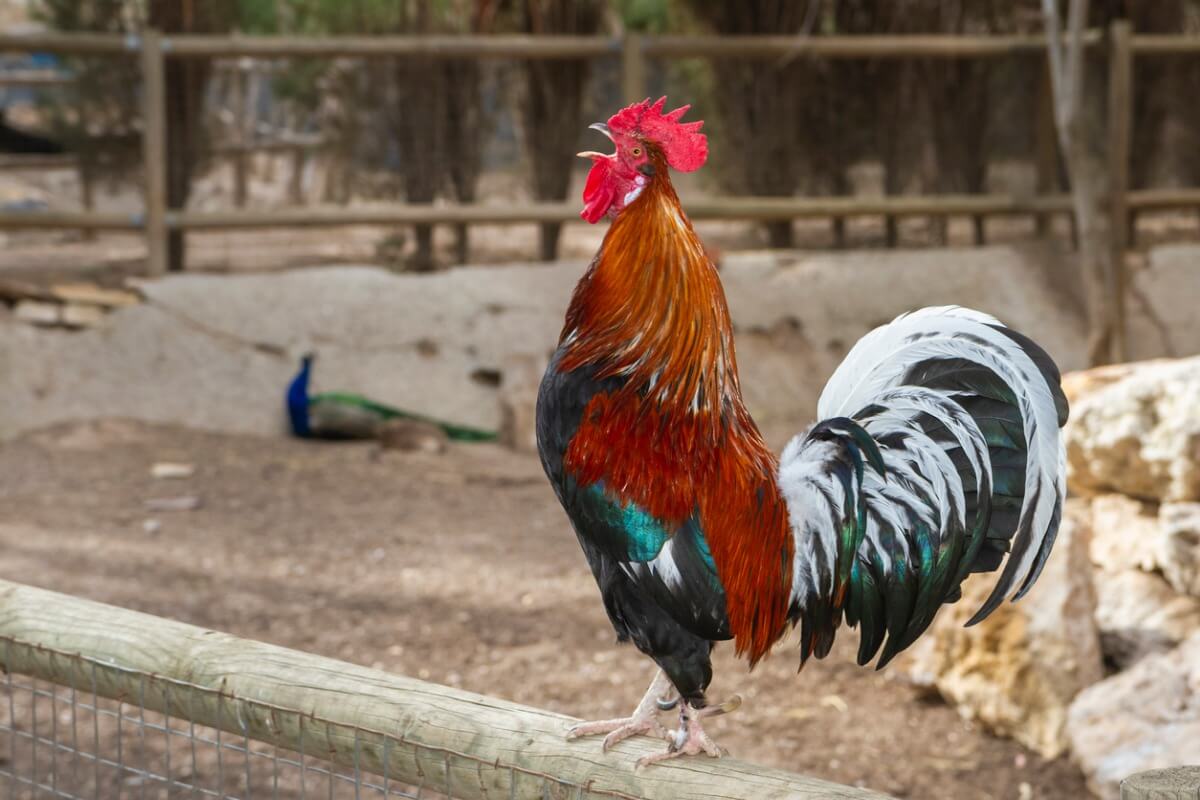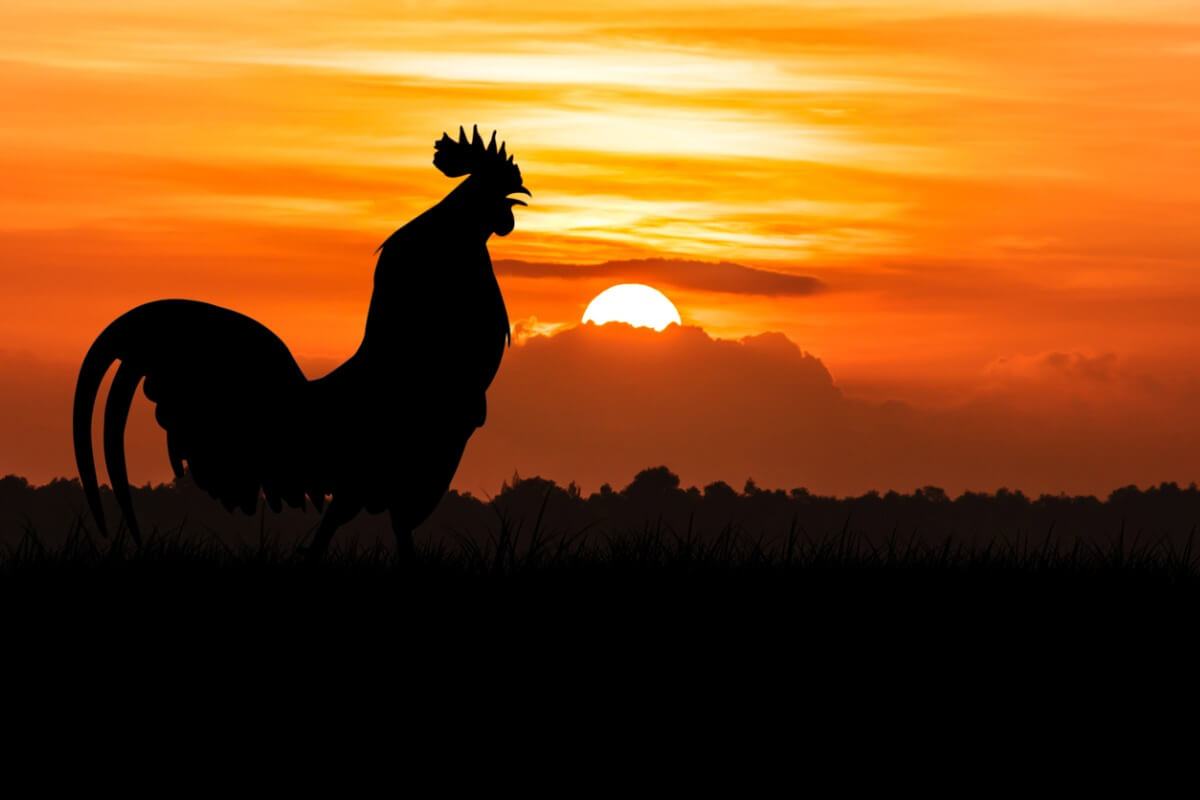Why Do Roosters Crow?

Quiquiriquí, in Spanish; cock-a-doodle-doo, in English; cocorico, in French; ko-ke-kok-ko, in Japanese and ü-ürü-ü in Turkish. These are some of the onomatopoeias that try to represent the crowing of the rooster – a sound that’s heard in every part of the world. They’re some of the most numerous birds on the planet, but have you ever wondered why roosters crow?
Their singing isn’t only due to the beginning of a new day, as there are also many other factors behind this curious vocal behavior. In this article, we’ll tell you why roosters crow and how their body functions in order to let them know when they have to.
Before you know why roosters crow
Roosters and hens (Gallus gallus domesticus) are gregarious birds with a defined social system and hierarchical order, where there’s a dominant male. On the other hand, chickens have their own hierarchical order, independent of males, although they do live with males of the same species.
Roosters can be distinguished with the naked eye from chickens, as they are larger and weigh more. They both have a large red crest on their heads.

A little bit of history
Roosters were domesticated in the second millennium BC, in Southeast Asia and in China. Over the years, roosters and hens started to turn up all over the world. For example, at the end of the Middle Ages and the European Renaissance, chickens were of great importance in food.
The chicken family (Phasianidae ) is believed to be the first European animal group to reach America. Christopher Columbus shipped chickens on his second voyage, as they took up little space, were easy to feed, and produced eggs.
However, before the arrival of the Europeans, the Mapuche hen existed in Chile, raised by the Mapuche themselves. Its origin is still a topic of hot debate and multiple genetic tests have been performed to establish its phylogeny.
Why do roosters crow?
Before alarms existed, roosters were in charge of waking us up to start the day and, even in the countryside today, they’re still the natural alarm clock that nature gives us. Roosters crow daily and many times a day: at noon, in the afternoon, and at dawn. This is the most important song with which they show their power.
But why do roosters crow, and, on top of that, several times a day? According to EarthSky, they do it to get ahead in the search for food, attract females, and defend their territory, as their song means a sign of power and dominance for the other roosters. If another male from the same pen answers the song, there will be a musical – and then physical – fight.
As indicated by the Wakan Wild Guide portal, in addition to showing power with their singing, roosters also establish their dominance with their strutting and the coloration and swelling of their crest. This is a clear mechanism of sexual selection, where males spend energy and resources in appearing sexually attractive, in order to attract the attention of females.
Roosters and chickens
Roosters usually sing from the highest point of their territory or henhouse, so that others are aware of their presence and in order for their singing to reach further. This way, females will know that the dominant male has food to offer them and that he is sexually active. The singing of these males appears to stimulate ovulation in the hens.
Roosters are the most famous singers in the world of chickens, but the latter aren’t totally silent either. When they see a hawk, for example, they let out a cry for their chicks to hide. In addition, they cackle constantly, a sound that the rooster also makes when mating.
Their internal clock
Almost all animals have daily cycles of activity, known as circadian rhythms. These regulate the changes in physical and mental characteristics that occur in a day in different living beings, according to the NICHD.
Circadian means ‘about a day’. The biological clock of organisms – located in the hypothalamus – controls metabolic and hormonal rhythms in the 24-hour interval. This is the internal clock that roosters have, in order to anticipate sunrise without the need for daylight and thus know when to sing – so says National Geographic.

Now, you know why roosters crow and how their body functions in order to let them know when to do it. Singing is simply one more display of power in a social hierarchy, a behavioral trait that allows dominant males to stand out among the weakest. In nature, behavior is never random.
All cited sources were thoroughly reviewed by our team to ensure their quality, reliability, currency, and validity. The bibliography of this article was considered reliable and of academic or scientific accuracy.
Colaboradores de Wikipedia. (2021, 17 mayo). Gallus gallus domesticus. Wikipedia, la enciclopedia libre. https://es.wikipedia.org/wiki/Gallus_gallus_domesticus
EarthSky. (2017, 11 noviembre). What makes a rooster decide to crow? https://earthsky.org/earth/why-roosters-crow#:%7E:text=A%20rooster%20crows%20because%20he,crow%20%E2%80%93%20in%20a%20daily%20cycle.&text=Roosters%20anticipate%20sunrise%20to%20get,food%20and%20defense%20of%20territory
Lee, J. J. (2021, 4 mayo). How a Rooster Knows to Crow at Dawn. Animals. https://www.nationalgeographic.com/animals/article/130318-rooster-crow-circadian-clock-science
NICHD. (2018, 9 julio). ¿Qué son los ritmos circadianos? https://espanol.nichd.nih.gov/salud/temas/sleep/informacion/circadianos
Sanz, E. (2012, 15 octubre). ¿Para qué cantan los gallos? MuyInteresante.es. https://www.muyinteresante.es/curiosidades/preguntas-respuestas/ipara-que-cantan-los-gallos#:%7E:text=Los%20gallos%20son%20aves%20territoriales,y%20atraen%20a%20las%20hembras.&text=Tambi%C3%A9n%20emiten%20un%20cacareo%20similar,para%20avisar%20a%20las%20hembras
Wakan. (2014, 1 diciembre). ¿Por qué cantan los gallos al amanecer? http://wakan.org/por-que-cantan-los-gallos-al-amanecer/#:%7E:text=Pero%2C%20%C2%BFpor%20qu%C3%A9%20cantan%20los,en%20los%20cambios%20de%20estaci%C3%B3n.&text=As%C3%AD%20pues%2C%20el%20canto%20que,controlado%20por%20el%20ritmo%20circadiano
